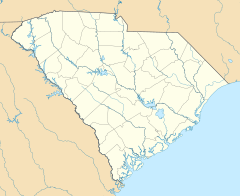Pumpkintown, South Carolina facts for kids
Quick facts for kids
Pumpkintown, South Carolina
|
|
|---|---|
| Nickname(s):
"Punkin'town"
|
|
| Country | United States |
| State | South Carolina |
| County | Pickens County |
| Settled | 1745 |
| Elevation | 958 ft (292 m) |
| Time zone | UTC-5 (Eastern (EST)) |
| • Summer (DST) | UTC-4 (EDT) |
| GNIS feature ID | 1250271 |
| Other names | Pumpkin Town Punkin Town |
Pumpkintown is a small, quiet community in Pickens County, South Carolina, in the United States. It's not a city or a town with its own local government. Instead, it's an unincorporated community. This means it's a group of homes and businesses that are part of the larger county, rather than having their own mayor or city council. You can find Pumpkintown along South Carolina Highway 8, which is northwest of a bigger city called Greenville.
Contents
A Look Back at Pumpkintown's Past
Pumpkintown has a long history, going back even before the year 1791. It was first settled around 1745. The community was originally known as "Pumpkin Town."
How Pumpkintown Got Its Name
The story behind the name is quite interesting! An early traveler, whose name isn't known, was passing through the area. They were amazed by what they saw in the nearby Oolenoy River valley. The valley was completely covered with huge, bright yellow pumpkins! This impressive sight led the traveler to call the place "Pumpkin Town," and the name stuck.
Life in Early Pumpkintown
In the early days, communities like Pumpkintown were often farming areas. People grew their own food and raised animals. The rich soil of the Oolenoy River valley would have been perfect for growing crops, especially those large pumpkins that gave the town its name. Life would have been much simpler, with neighbors helping each other.
Pumpkintown Today
Today, Pumpkintown remains a peaceful, rural community. It's a place where people can enjoy the quiet beauty of the South Carolina countryside. While it might not be covered in pumpkins anymore, its unique name reminds everyone of its interesting past.
 | Laphonza Butler |
 | Daisy Bates |
 | Elizabeth Piper Ensley |


